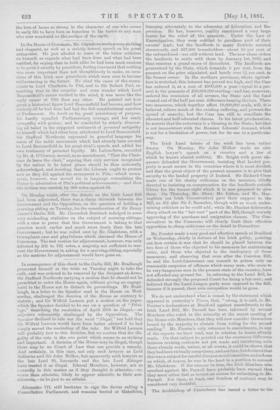In the House of Commons, Mr. Gladstone made a very
striking and eloquent, as well as a strictly honest, speech on his great antagonist. He just alluded to some of the bitter criticism on himself, as regards what had been done and what had been omitted, by saying that in both alike he had been most anxious to be guided strictly by precedent, feeling convinced that nothing was more important than not thoughtlessly to make, on occa- sions of this kind, new precedents which were sure to become embarrassing in the future. He cited the cases of the monu- ments to Lord Chatham, to Pitt, and to Sir Robert Peel, re- marking that in the surprise and even wonder which Lord Beaconsfield's career excited in the mind, it was more like the early career of Pitt than any other. He pointed out how great a historical figure Lord Beaconsfield had become, and how entirely all he had done had had the full constitutional sanction of Parliament. He dwelt on his great persistency of purpose, his hardly equalled Parliamentary courage, and his ready sympathy with genius; and he concluded by utterly disavow- ing all belief in the supposed sentiment of personal antipathy to himself which had often been attributed to Lord Beaconsfield. Sir Stafford Northcote expressed in graceful language his sense of the noble monument which had already been erected to Lord Beaconsfield in his great rival's speech, and added his own testimony of personal loyalty. Mr. Labouchere, seconded by Mr. A. O'Connor, moved, as an amendment, "That the Chair- man do leave the chair," arguing that only services recognised by the nation in its latest phase should be thus nationally acknowledged, and insisting that the Liberals ought to protest now as they did against the monument to Pitt,—which monu- ment, however, was moved for iu language committing the llouse to admiration of Pitt's political achievements ;—and then the motion was carried, by 380 votes against 54.






































 Previous page
Previous page